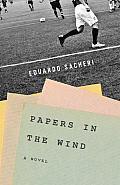The World Cup Really Isn’t as Important as the Bottle You Give Your Little Girl
“Papers in the Wind” by Eduardo Sacheri

Apparently this book’s gotten onto a list of books you should read in prep for the World Cup. Which seems funny to me, really, because although football (SOCCER, yes “SOCCER”) plays a part in the story, it mostly serves as a means to an end. These guys need money and football’s the way they’re gonna get it. The story, really, is about what it means to be a family.
Four guys from Argentina star in Eduardo Sacheri’s Papers in the Wind. Two brothers and their two friends from, well forever, are the makeshift family that drives the story with their playful jabs, shit talking and basic unconditional love for one another. None of the guys have much cash to start, but they do all right. One of the brothers, Mono may have made a stupid investment, though, putting almost $300,000 into the future of a young football player who can’t seem to score a goal. And then, things get complicated when Mono is diagnosed with Pancreatic Cancer, a type that kills 85% of people diagnosed within the year.
Really, the only thing that’s at stake is family. Mono’s the father of a baby girl named Guadalupe whose mother Lourdes really doesn’t want to have anything to do with his three friends. If it were up to Lourdes, neither the baby’s biological uncle, nor the paternal grandmother, nor the two unrelated-by-blood uncles would ever have the right to visit her baby girl. And of course, after Mono’s death, there’s not much the courts could do to change that. So, in order to see this little girl, the guys come up with a plan: They’re going to have to buy this babies future by selling off Mono’s failing player, keeping the cash as a bargaining chip with the mother. Guadalupe’s going to get $1,000 a month until she’s 21, and in return, Lourdes lets the uncles see her, lets her grandmother get to know her and ultimately, is agreeable during the whole time.
The problem is, this whole plan will fail if they can’t get the players’ stocks up. Without the money from selling his futures, they don’t have a dime to give to Lourdes, and without the money, she’s got no reason to be compliant with the guys.
It’s the most touching thing, really, how hard these uncles fight for the little girl they don’t even know yet. She’s already the fifth member of their gang before she’s uttered her first words.
There’s a passage in here that perfectly summarizes these guy’s philosophy about children, biological or not, that I can’t help but quote at length:
“I’m saying that DNA can suck my balls, if you know what I mean. Imagine they come and tell me that Luli is adopted. Or Ana, my Anita, is adopted…
If they come now to tell me, now that the twins are three years old, that they’re not my daughters, that they’re somebody else’s daughters, I couldn’t give two shits, you know what I mean? Because I changed their diapers, and I gave them their bottles, and I sang them to sleep. What do I care whose sperm they came from? That’s not what makes them my daughters. They’re my daughters because of all the rest.”
This is to-the-dot the attitude they carry on to Guadalupe. It’s what makes them keep fighting for the cash.
And really, some of the ways they try to raise the profit for this player are hilarious. At one point, they think about bribing a journalist to print different stats to make it look like their guy scored when he never even got close, so at least when teams read the paper, they’d think he had potential (but ultimately, if they looked at any of the tapes, they’d figure things out).
It’s really cheesy and simplistic to say it’s the love that makes this story work, but credit where credit is due: It’s the guy’s love for this baby girl and her father that make you glued until the end, wondering whether or not their schemes are going to work out. The schemes, the football, the sarcastic digs they throw along at each other and their short interjections of philosophical conversations and discussions about God, are what keep it interesting along the way. But ultimately, don’t read this book because you give a damn about the World Cup.





